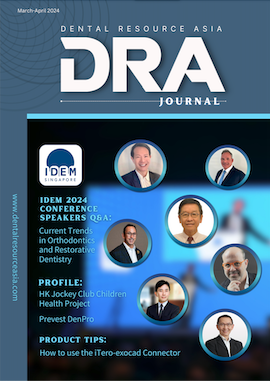Japan: An online survey conducted by researchers from the Tokyo Medical and Dental University identified factors that influence cancer patients’ disclosing behaviour in dental clinics.
The research team from the University’s Graduate School of Medical and Dental Sciences found patients who were referred by their physicians or have a good relationship with their family dentist were more likely to disclose their cancer diagnosis.
Titled “Factors influencing patient disclosure of cancer diagnosis to the family dentist: online survey in Japan”, the study was published in the Scientific Section of the Nature journal.
Physicians can influence patients to undergo cancer screening
The cross-sectional questionnaire study, which was conducted via the Internet revealed that communication from medical workers was a motivating factor for the disclosing behaviour of patients. Medical workers involved in cancer care are required to demonstrate the benefit of medical-dental collaboration to patients.
According to the research team, their findings support the results of previous studies that showed the physician’s recommendations is a motivating factor for patients and associated with their willingness to undergo cancer screening.
 Click to Visit website of India's Leading Manufacturer of World Class Dental Materials, Exported to 90+ Countries.
Click to Visit website of India's Leading Manufacturer of World Class Dental Materials, Exported to 90+ Countries.
Lack of medical–dental collaboration
While convinced of the benefits of medical–dental collaboration towards encouraging the positive patient behaviour, the researchers also note a lack in existing communication channels.
“Cancer patients are less aware of their oral health due to fear of death and anxiety about treatment,” sad the authors.
“It is necessary to fully inform patients of the significance of oral care and the benefits of medical–dental collaboration, and to link this to patient behaviour.
“Only 8.6% of our respondents were advised by their physician; this indicates the need to encourage attending physicians to advise their patients.”
Other variables have little impact
The test results for the attending physician’s advice and the frequency of disclosing showed that the group with physician’s advice differed from the group without physician’s advice.
They proceeded to evaluate the group without physician’s advice.
They found other variables – including the facilities of the dental clinic facilities or the public health care insurance coverage of “perioperative oral care” – had little impact on the disclosing behaviour.
While it “may be necessary to inform more cancer patients and medical workers that patients can receive “perioperative oral care” for a small financial contribution” they said the study suggests that “establishing good communication may significantly influence disclosing behaviour more than other factors”.
Physician’s communication style can alleviate patient anxiety
The researchers also support the assertion that the physician’s communication style can alleviate patients’ anxiety and improve satisfaction, and that the patients’ perceptions of good communication with their dentists help them receive appropriate oral care.
The researchers also acknowledged the limitations of the study’s cross-sectional design.
“The study’s cross-sectional design precludes the detection of a causal relationship, and the change in awareness of health and oral care that occurred after disclosing cancer diagnosis to the family dentist may have influenced the responses,” they explained.
“The results of this study do not facilitate a discussion of exclusion criteria or examination of factors other than those specified in the questionnaire. This study does not reflect differences in the distribution of cancers.”
Read the full article: Factors influencing patient disclosure of cancer diagnosis to the family dentist: online survey in Japan.
The information and viewpoints presented in the above news piece or article do not necessarily reflect the official stance or policy of Dental Resource Asia or the DRA Journal. While we strive to ensure the accuracy of our content, Dental Resource Asia (DRA) or DRA Journal cannot guarantee the constant correctness, comprehensiveness, or timeliness of all the information contained within this website or journal.
Please be aware that all product details, product specifications, and data on this website or journal may be modified without prior notice in order to enhance reliability, functionality, design, or for other reasons.
The content contributed by our bloggers or authors represents their personal opinions and is not intended to defame or discredit any religion, ethnic group, club, organisation, company, individual, or any entity or individual.


